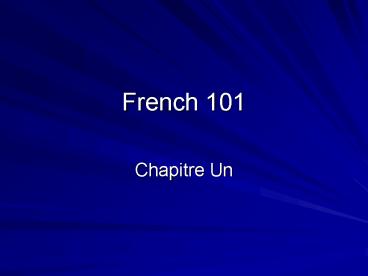French 101 - PowerPoint PPT Presentation
1 / 13
Title:
French 101
Description:
Using the scale, indicate your attitudes toward each of the ... Intonation: Tu regardes la t l ? Est-ce que: Est-ce que tu regardes la t l ? N'est-ce pas? ... – PowerPoint PPT presentation
Number of Views:137
Avg rating:3.0/5.0
Title: French 101
1
French 101
- Chapitre Un
2
Les Noms Et les Articles
- Indefinite Articles - Articles indéfinis
- Definite Articles - Articles définis
3
- Communication
- Reactions Words often evoke positive, negative,
or neutral feelings. Using the scale, indicate
your attitudes toward each of the following
words. - Exemples Jaime bien le cinéma.
- Jadore les vacances.
- Je déteste Jaime bien Jaime beaucoup Jadore
- 1. le football 6. les sports
- 2. le cinéma 7. les vacances
- 3. le chocolat 8. la politique
- 4. la nature 9. la télévision
- 5. la musique 10. la solitude
4
- Opinions
- Using the cues provided, tell what you like or
dislike doing and tell why by using these
adjectives - Exemple français/facile
- Jaime étudier le français. Je trouve ça facile.
- Regarder/ intéressant
- Histoire/ ennuyeux
- Voyager/ agréable
- Maths/ difficile
- Anglais/ facile
- Campus/ agréable
- Travailler/ désagréable
5
- Pronoms sujets - French Subject Pronouns
- The subject of a sentence is the person or thing
which performs the action. Subject pronouns
replace this person or thing. You must understand
subject pronouns before you begin conjugating
verbs, as the form of verbs changes for each
one.
6
- Les Pronoms sujets
- Singular Plural
- 1st person je I nous we
- 2nd person tu you vous you
- 3rd person il he,it ils they
elle she,it elles they on
one
7
Regular -ER Verbs
- Les verbes du premier groupe
- Aimer to like or to love
- Arriver to arrive or to happen
- Chanter to sing
- Chercher to look for
- Danser to dance
- Demander to ask for
- Détester to hate
- Donner to give
- Écouter to listen to
- Étudier to study
- Jouer to play
- manger to eat
- nager to swim
- Parler to talk or to speak
- Regarder to watch or to look at
- Rêver to dream
- Skier to ski
- Travailler to work
- Trouver to find
- Visiter to visit (a place)
8
- The verb form that ends in -er is called the
infinitive (in English, the infinitive is the
verb preceded by the word "to"). -er is the
infinitive ending. The verb without the -er is
called the stem or radical. - To conjugate an -er verb, remove the infinitive
ending and then add the appropriate endings, as
follows
9
- Singular
Plural - 1st person je -e
nous -ons - 2nd person tu -es vous
-ez - 3rd person il -e ils
-ent
10
- Parler
- Je parle nous parlons
- Tu parles vous parlez
- Il parle ils parlent
11
- Examples
- Nous parlons français en classe.
- Elle regarde souvent la télé.
- Nous mangeons souvent au resto.
- Les étudiants travaillent bien.
- Vous étudiez tout le temps.
- Tu voyages rarement en groupe.
- Je nage le matin
12
La Forme Négative
- Subject ne verb pas
- Je ne parle pas anglais.
- Il naime pas les sports.
- Subject ne verb jamais
- Nous ne regardons jamais la télé.
13
La Forme Interogative
- Intonation
- Tu regardes la télé?
- Est-ce que
- Est-ce que tu regardes la télé?
- Nest-ce pas?
- Tu regardes la télé nest-ce pas?































